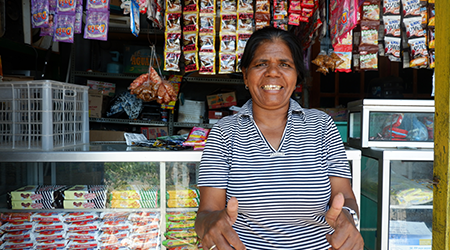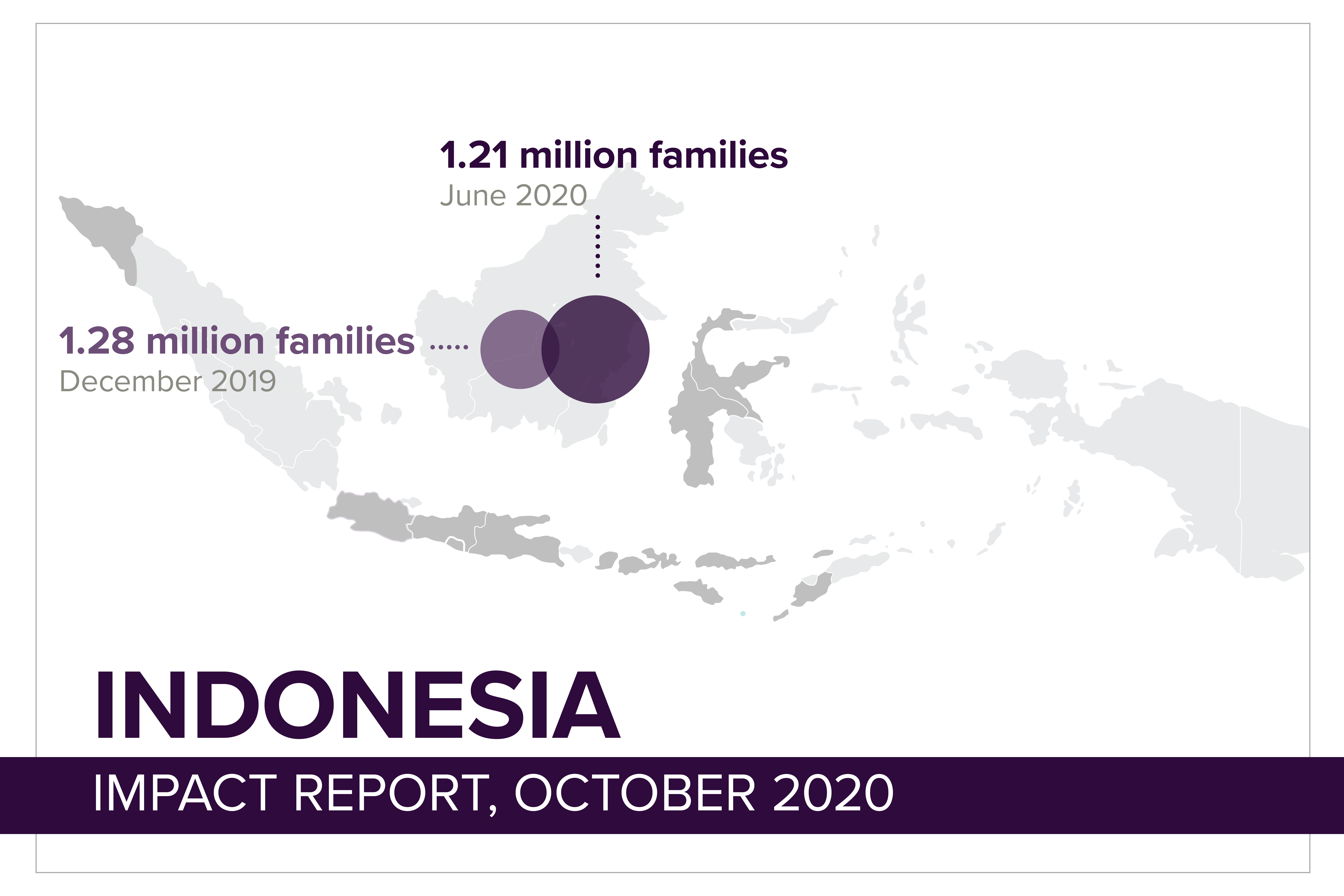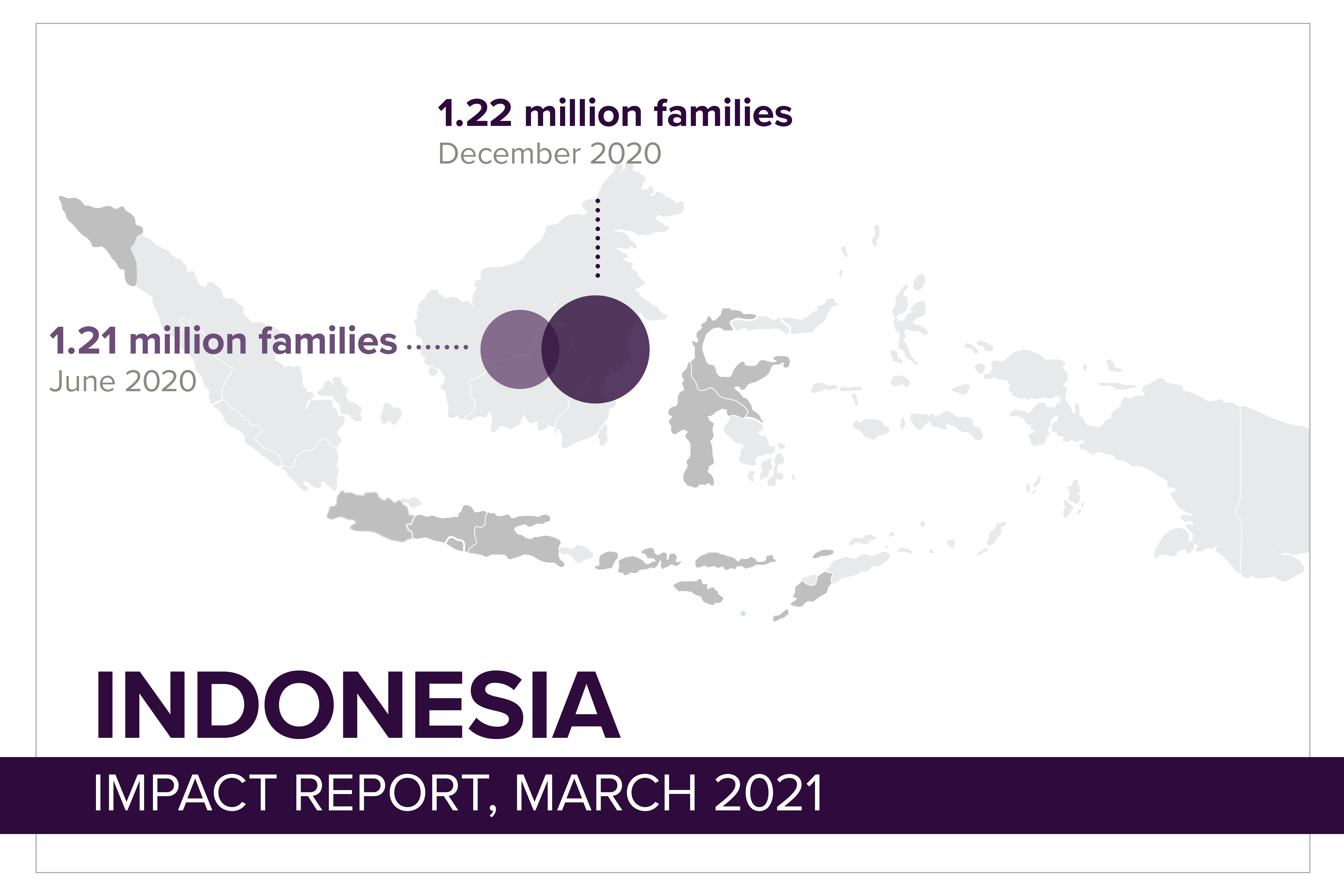Data to June 2021.
In the last six months, Opportunity International Australia’s local microfinance partners have seen Indonesia’s second wave of COVID-19 cause widespread sickness and death amongst the communities they serve.
We are happy to see the reported cases now decreasing, which is a hopeful sign that business for our clients is improving, however, those living in poverty and forced to reside in close proximity to others, remain especially vulnerable.
Opportunity’s microfinance program in Indonesia is supported by the Australian Government through the Australian NGO Cooperation Program (ANCP).
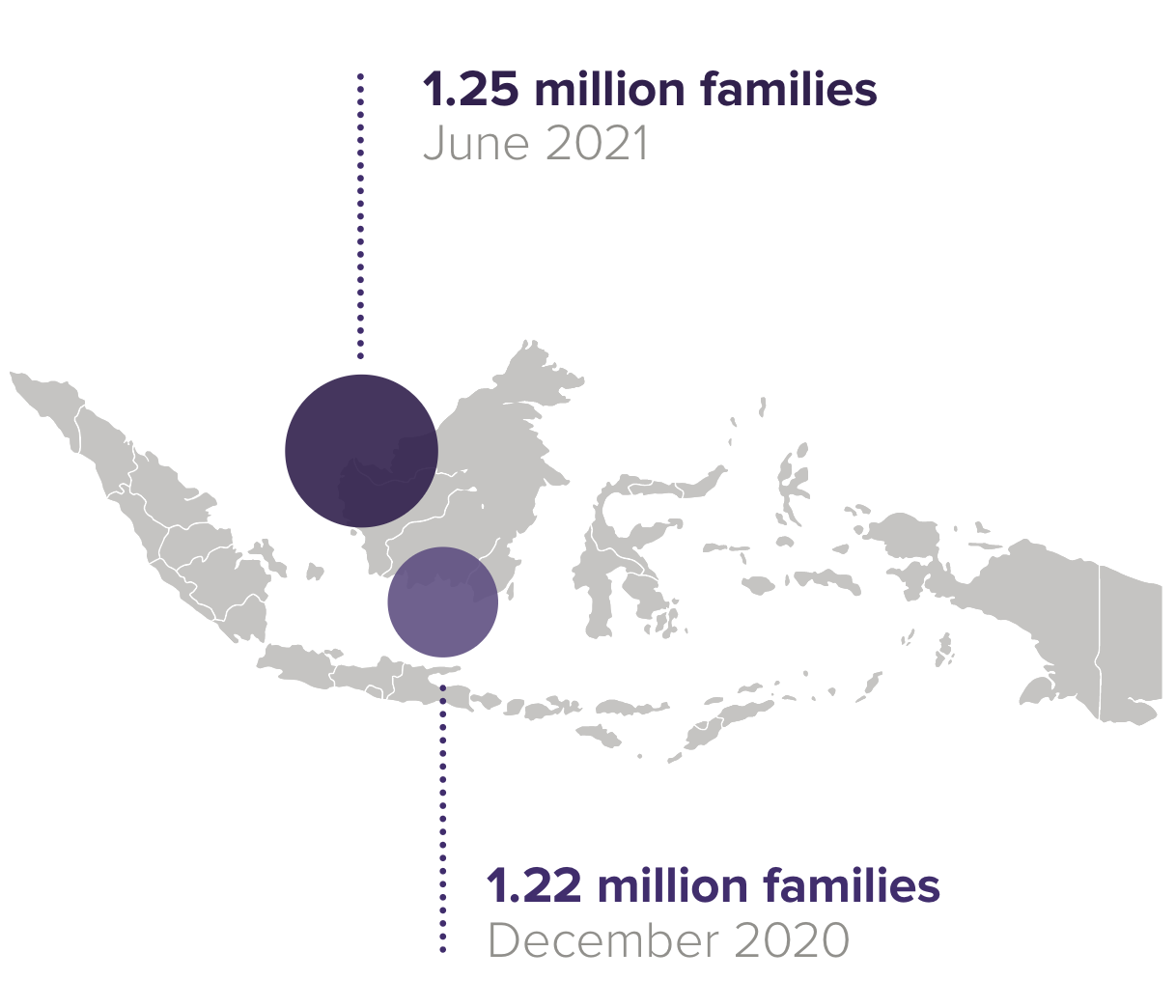
Strategic direction
As Indonesia struggles through the pandemic, Opportunity remains committed to working with our clients and their communities to stop the spread of COVID-19 and support each client in rebuilding their businesses and lives.
People living in poverty are extremely resilient and we will continue to support their hard work by providing affordable, high-quality financial services, so that they have the business capital needed to generate the income vital for their families.Then came the massive task of assessing every client’s business and situation, as well as making adjustments to products and services to ensure that clients had adequate cashflow to pay for the resources they required.
The pandemic has also made it very clear that at times our clients also need other services to break free of poverty. Specifically, we are working with our clients, many of whom are illiterate, to ensure they have a clear understanding of how to avoid getting sick from COVID-19. Where there are limited services available, we are also facilitating vaccinations and related medical support.
It has also highlighted the value of the 124 clients, who our partner KOMIDA has trained as Health Leaders in the past year, to provide over 17,000 people with basic health education.
Looking forward, we will expand that program to our other partners to ensure that all our clients and their communities have a better understanding of the role that factors such as clean water, sanitation and nutrition can play in remaining healthy.
We are also evolving our use of technology to gain further insights into both the financial and non-financial obstacles that keep people living in poverty. This will allow us to better understand the challenges and deliver services in even more efficient ways, especially in remote regions where the most vulnerable communities reside.
Partner performance
Opportunity’s largest partner, KOMIDA, has struck a steady course throughout the last six months. Client numbers, lending and PAR (portfolio at risk) have all been affected by the impact of COVID-19 along with associated lockdowns in many of KOMIDA’s areas of operations.
BAV has seen increases in client numbers and lending, but PAR, while declining, remains high. The strong focus on people development has been core to BAV managing the challenges associated with the pandemic.
TLM continues to grow, especially in the remote, rural areas where they focus. A recent impact survey confirmed they are highly valued by their clients who have felt very supported throughout the pandemic.
Opportunity is working closely with our newest partner YCAB to help them adjust their product and services to better align with the needs of the communities they serve. This, along with the pandemic has resulted in a reduction in clients over the past six months and a high level of PAR. We will continue to support this process and look forward to being able to provide this support face-to-face when travel opens up.
Partner summary
| Families Reached | Loans Outstanding A$'000 | Operational Sustainability | Portfolio at Risk >30 days | |
|---|---|---|---|---|
| KOMIDA | 723,164 | $157,377 | 112.48% | 2.66% |
| BAV | 384,632 | $114,106 | 105.36% | 23.69% |
| TLM Co-operative | 130,900 | $21,248 | 145.23% | 1.22% |
| YCAB | 20,811 | $2,082 | 165.17% | 22.25% |
| Overall | 1,259,507 | $294,813 |
Data from June 2021
PAR is unusually high in this reporting period as all loans that were restructured due to COVID-related hardship or moratoria have now been consolidated. We are already seeing pleasing decreases in PAR for some partners, and we expect this to continue as recovery gets underway.
Portfolio at risk (PAR) is a stringent measure of a microfinance institution’s loan portfolio quality. The portfolio at risk calculates the total value of outstanding loan balances for loans, for every payment that is overdue by more than 30 days. Operational self-sustainability (OSS) is the ability of an organisation to cover the costs of its lending program with the revenue earned from its lending program.
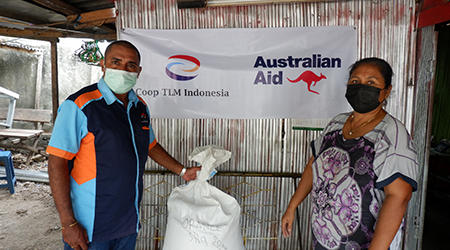
Case study
Innovation overcomes obstacles
Getting product to market, always challenging for remote farmers, has been made even more difficult by the movement restrictions of COVID-19. Opportunity partner TLM is using a novel approach to increasing market access and revenue for farmers and small kiosks in towns. In 2020, TLM started a business unit, named Kuan TLM, to help clients access new markets and create a self-sustainable program that buys rice directly from farmers, thus enabling them to secure higher incomes.
Using funds from Opportunity’s supporters, TLM bought the rice harvest of 137 client farmers which they sold directly to kiosk clients in West Timor’s biggest city, Kupang. This direct model, which cuts out the ‘middle-men’, allowed TLM to pay farmers higher prices than they’d previously received, increasing client incomes by 38 per cent. The network of 108 active kiosks in Kupang which bought the rice stock (99 were existing clients), increased turnover and income as well.
The scheme is also helping TLM clients transition to digital payments. Initially insisting on being paid cash for their crops by the truck drivers who collected the rice, farmers quickly discovered that drivers were asking them to cover ‘unexpected shipping costs’ out of the cash they received. When TLM instituted electronic payments, the farmers found that receiving – and keeping – their full payments, removedhesitancy about electronic funds transfers.
TLM provided quality control training to justify the higher prices the products now command and farmers are pleased to be recognised for their high-quality produce. For TLM, the envy of local farmers who were not initially included in the scheme provides a direct path to the program’s expansion.
So far, catering to growing popularity, TLM has engaged seven farmers to act as agents, expanding rice purchases to another 33 local farmers. To help increase sales, TLM staff also buy the rice for personal use (1.2 tonnes per month) and the produce is additionally being sold by the co-operative’s direct-to-the-public shop at their head office. Having added rice to the inventory, TLM now intends to expand to candlenut and tamarind, as well as horticultural products. The shop also sells clients’ weaving products to help clients through the pandemic-related tourism downturn.
Always seeking new ways of helping clients grow their businesses, TLM is now invigorating an existing market at Laisana Beach in partnership with the provincial government to create outlets for clients’ products and handicrafts to be sold to domestic tourists and, eventually, international visitors.
TLM is also currently developing software to collect data for monitoring and reporting on the program. Since many clients don’t yet have smart phone access, about half the information is currently collected manually, but TLM plans to automate this as soon as possible.
The innovative way TLM has used these initiatives to help rural farmers and kiosk owners really demonstrates the extra yards our partners go to assist their clients and the communities in which they work.” - Simon Lynch, Indonesia Director, Opportunity International Australia
Voice of the program
Yuliana Tennis and her husband always worked hard. She had been a teacher and he a massage therapist. When the lengthy travel time to the school became too much, Yuliana opened a small kiosk in Kupang. After several years, her family’s income enabled them to gain a microfinance loan to build a house and rent out its rooms.
When Yuliana was widowed in 2014, she joined TLM as a client. With an 11-year-old son to bring up alone, she wasn’t able to continue her loans. She steadily built up her kiosk with the help of the rental income from the house and in January 2021 she rejoined TLM with a new loan.
By June Yuliana had become a sales agent for Kuan TLM, the co-operative’s business unit. She started by ordering rice, wheat and noodlesand has expanded into vegetables with shallots and garlic.
While she says she’s seen no significant price difference since switching from a distributor, the ability to order many lines in one place is a big drawcard, as is TLM’s delivery of the goods straight to her shop. This makes choosing TLM an easy decision for Yuliana and ultimately, many others like her.
This project is supported by the Australian Government through the Australian NGO Cooperation Program (ANCP).
Impact Stories
Your support is empowering these women—and millions more like them—to create a new future for their families, free from poverty.

“I only wish my children could finish high school.”
– Marce, Rote Island
Marce makes and sells cakes, as well as fish she catches along the beach, to provide for her family.

"I hope my children can now be successful."
– Oktavin, Rote Island
A savvy business idea and a small loan helped Oktavin start a grilled fish business that quadrupled her family's income.

“Sometimes when we get a small harvest, I give some to my son to eat."
– Heni, Rote Island
Heni part owns a community garden which provides her family with fresh food and addtional income.

“I wish I can do the best for her (my daughter)."
– Marta, Oebelo
Marta's salt business is growing and her family is working hard to break the poverty cycle.
